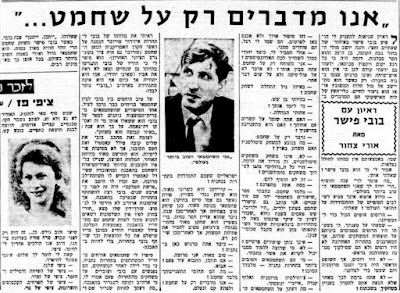Moshe Roytman notifies us that Al Ha'mishmar, 1.7.68, p. 2, has an interesting interview with Robert "Bobby" Fischer by Uri Tzahor [ph. spelling].
Some interesting notes is that Fischer claim to make his living from the royalties from his books and his chess column in Boys' Life (see the link for Edward Winter's article on the subject). Fischer notes in particular that he does not give chess lessons or play simultaneous games, which "did not help" those masters who gave them. Fischer "forgot," notes Tzahor, his tournament appearance fees or winnings.
Fischer arrived two an a half hours late to the interview, and to the first question, "Who is Bobby Fischer?" he replied, "the world's best chess player." Given Fischer's later well-known antisemitism (or perhaps paranoia), it is noted that not only did Fischer agree to play in Netanya, but also was satisfied with the conditions and was willing to come again.
He explicitly declines to discuss anything except chess, in particular refusing to answer Tzahor's incautious question about "how a Jew like you can join the Adventists sect?" He blames the Soviets for collaborating against him out of fear. He ended the interview when Tzahor asked what he no doubt considered an intrusive question, "what are you interested in except for chess?"
In a coda to the interview, Tzahor adds his own thoughts. He notes that Fischer likes Fidel Castro and the Cuban people in general - not for political reasons, but due to the warm reception he received there and the legal loophole which allowed him to legally play in Havana, 1965, through telex, despite the American embargo.
Tzahor also adds one of the stories about Fischer's alleged ignorance anything except chess. He claims that "soviet players like to tell" that when Vasco da Gama was mentioned in his presence, Fischer asked "what team does he play on?" Whether this story is factual or not, I make no judgment.












